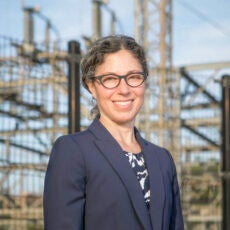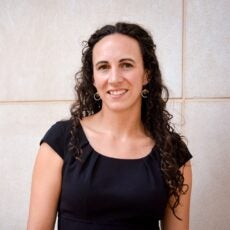Watch the recording.
Repurposed Energy
Event Summary
As the impacts of climate change from drought, fire, flooding, and heat waves become increasingly dire, there is growing urgency in accelerating a clean energy transition from fossil fuels to zero-carbon energy infrastructure. At the same time, however, the hurdles to accomplishing such a massive industrial-scale transition seem increasingly high. These obstacles include governance structures, political economy, decision-making dynamics, and environmental justice concerns. The impacts of these obstacles are very real and apparent, with large renewable energy generation and transmission projects regularly facing denials or uneconomical delays.
With respect to governance, a mismatch between the scale of projects and the level of the regulator hinders development, with local governments retaining permitting authority for projects of statewide importance, and state governments retaining permitting authority for projects of regional or national importance. Political economic barriers also abound and are particularly large in this space; the bulk of the energy infrastructure for the transition—aptly-named wind and solar “farms”—must be constructed in rural and rustbelt communities, where opposition to a clean energy transition is strongest as a political matter. And on the other side of the political aisle, progressive communities and environmental advocacy groups oppose many clean energy projects for their potential adverse aesthetic and environmental impacts in both rural and urban areas. Relatedly, the impacts of excessive “proceduralism” flowing from the political left also loom large: numerous permitting and environmental review requirements piled onto individual clean energy projects often ultimately kill them. And concerns about perpetuating historic injustices in energy siting—placing more infrastructure in already-overburdened communities or failing to ensure that benefits flow to marginalized communities—are vivid, and real.
Yet there is a potential solution—“repurposed energy”—that can overcome many of these barriers by building the bulk of new clean energy infrastructure on marginal farmlands, abandoned coal mines and coal plants, and other underutilized or abandoned contaminated properties, often called brownfields. Focusing on such lands comes at a perfect moment. The massive infusion of money from the Infrastructure, Investment and Jobs Act of 2021 and the Inflation Reduction Act of 2022 can make a repurposed energy transition a reality, particularly in rural America and post-industrial communities. In this public lecture, Kleinman Center Visiting Scholar Alexandra Klass will analyze repurposed energy as a critical solution to the many theoretical and real impediments to the energy transition.
View the Presentation
Repurposed Energy
Alexandra Klass
James G. Degnan Professor of Law, Michigan LawAlexandra Klass is the James G. Degnan Professor of Law at Michigan Law. Klass is a 2023-2024 Kleinman Center Visiting Scholar.
Shelley Welton
Presidential Distinguished ProfessorShelley Welton is Presidential Distinguished Professor of Law and Energy Policy with the Kleinman Center and Penn Carey Law. Her research focuses on how climate change is transforming energy and environmental law and governance.


